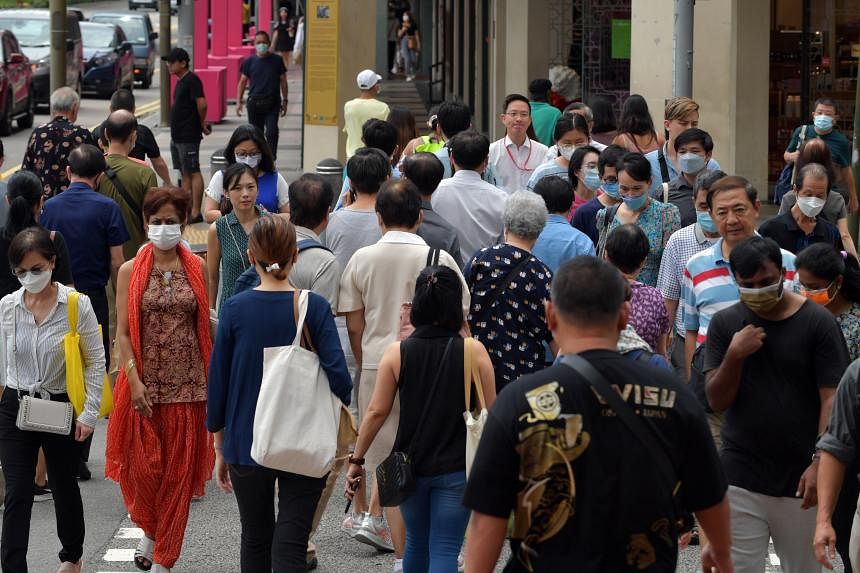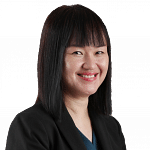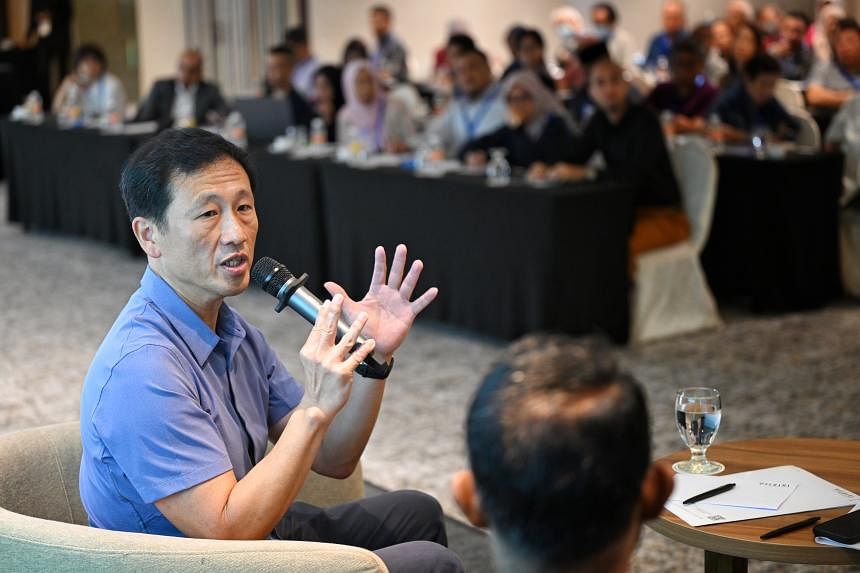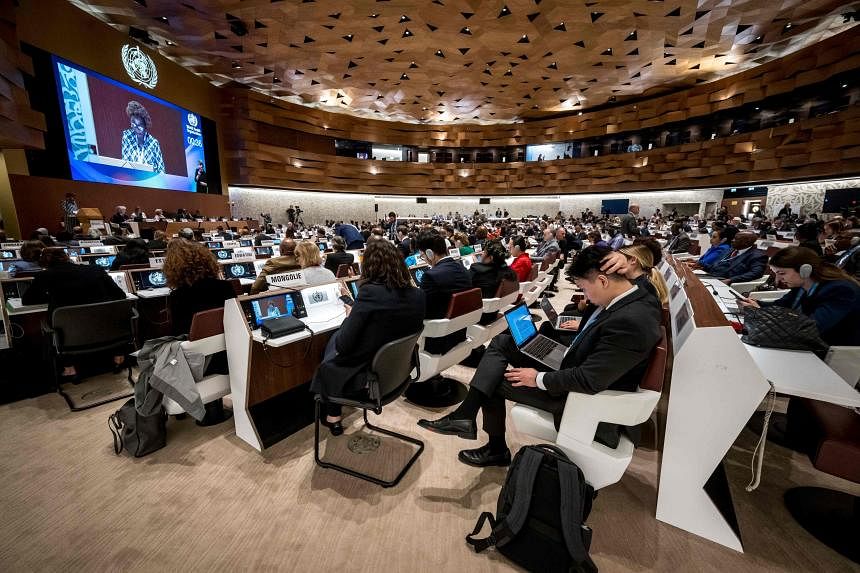- Joined
- Jul 14, 2008
- Messages
- 89,928
- Points
- 113
from straitstimes.com:
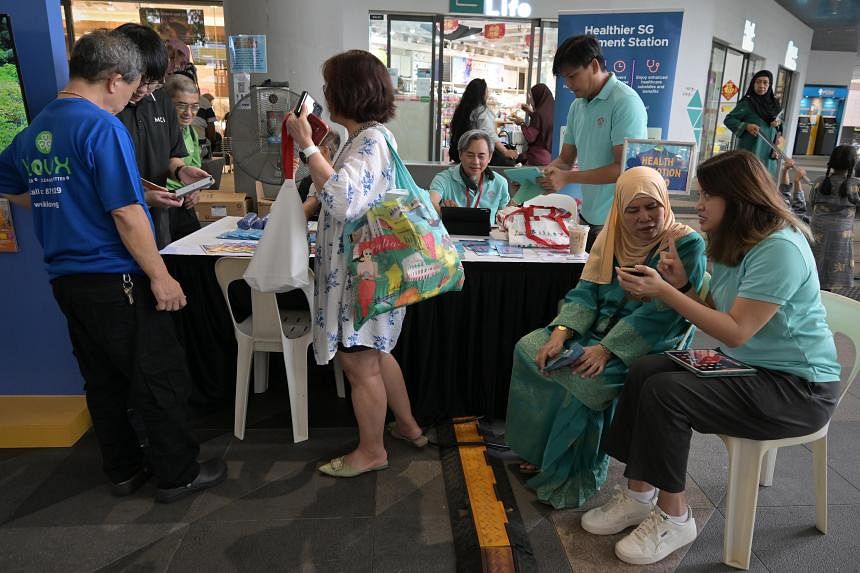
Residents at the Health Promotion Board booth during the Woodlands Town Hari Raya Open House and Gema Syawal 2024 in Kampung Admiralty. ST PHOTO: NG SOR LUAN
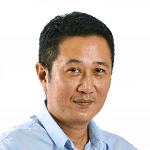
Zaihan Mohamed Yusof
Senior Crime Correspondent
UPDATED
MAY 04, 2024, 08:50 PM
FacebookTelegram
SINGAPORE – As the rain pounded parts of Woodlands on May 4, Health Minister Ong Ye Kung told his audience in Malay to “ready yourself with an umbrella before it rains”.
He was speaking to around 2,000 residents of Sembawang GRC attending the Woodlands Town Hari Raya Open House and Gema Syawal 2024 in Kampung Admiralty.
The event was held to raise awareness of preventive care and encourage more people to enrol in Healthier SG, a national initiative by the Ministry of Health (MOH) focusing on preventive health.
On the sidelines, Mr Ong told reporters that Healthier SG to date has more than 870,000 enrollees, of whom 77,000 are Malay/Muslim residents.
Mr Ong said: “Overall, nationally, we have about 37 per cent of the population 40 years and above already enrolled in Healthier SG. For the Malay/Muslim community, it’s about 30 per cent. So (it’s) slightly below the national average, but... a healthy number.”
To encourage more Malays to sign up with Healthier SG, MOH will work with Malay/Muslim organisations such as M3, a tie-up between Mendaki, the Islamic Religious Council of Singapore and the People’s Association Malay Activity Executive Committees Council.
Similar events are expected to be held in mosques, featuring Healthier SG booths and health ambassadors encouraging Malay/Muslims to join the initiative, which was launched on July 5, 2023.
Mr Ong told The Straits Times: “If we persuade enough (people), then... people will start to talk about it... People do talk about health, people do talk about the need for preventive care.
“(Healthier SG) is a concept I think everyone can accept. Why wait until you’re sick, and then you suffer, not just you suffer but your family suffers.”
The programme seeks to get Singaporeans to take proactive steps to manage their health, prevent the onset of chronic diseases and have strong support to lead healthier lifestyles.
At May 4’s event, attendees enjoyed Hari Raya dishes such as rendang, sambal goreng, sayur lodeh and ayam masak merah.
They were entertained by dances, a silat martial arts display and even Sembawang GRC MPs – Mr Ong, Dr Lim Wee Kiak, Mr Vikram Nair, Ms Mariam Jaafar and Ms Poh Li San – trying their hand at tying the samping, a traditional Malay costume.
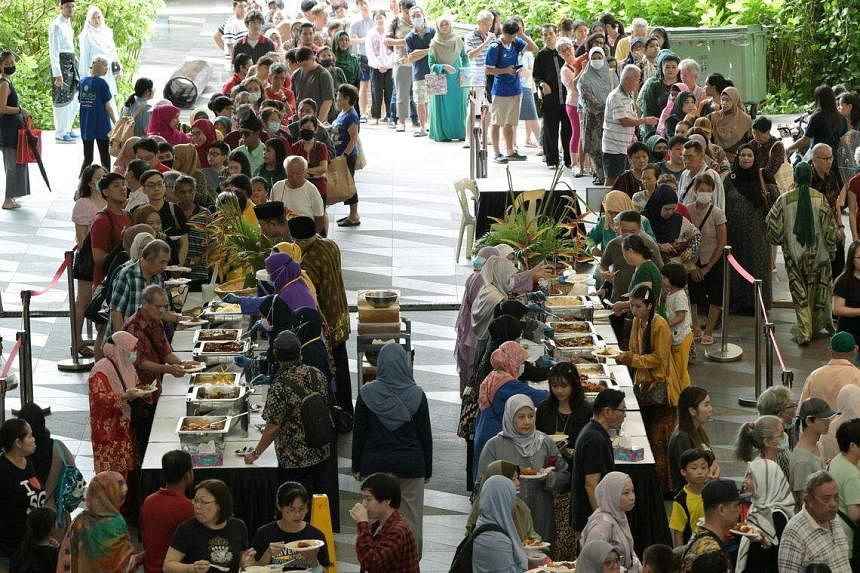
Attendees enjoyed Hari Raya dishes such as rendang, sambal goreng, sayur lodeh and ayam masak merah. ST PHOTO: NG SOR LUAN
Away from the stage and food offerings, visitors stopped at booths set up by various organisations.
At the Health Promotion Board booth, an information board on the Healthy 365 mobile app explained how a person’s sleep cycle could be monitored with a tracker compatible with the app. The booth also had reminders for visitors to get their health screenings done.
The booth by Kelab Kesihatan Woodlands, or Woodlands Health Club, promoted activities such as Zumba, trekking, cycling and piloxing.
Madam Siti Maimun, 62, who was at the event though she is not a Sembawang resident, said in Malay: “I’m open to healthy and simple activities because I can see from the photos of the activities that seniors also take part in them. My children have been nagging me to keep fit.”
Many who visited the booths picked up health brochures and free exercise bands as they left.
For Mr Kumarasamy Supaya, 52, and his wife, Madam Poongodi Rajamanikam, 49, visiting the Healthier SG booth was a priority.
The engineer, who had signed up with Healthier SG previously, was there to accompany Madam Poongodi as she enrolled in the programme.
He said: “My mother has diabetes and my father has a history of high blood pressure. I have moderate hypertension, and I’m concerned that if I do not monitor my health, I will fall sick without knowing it.”
Housewife Ann Toh, 44, said she was signing up with Healthier SG to encourage her two sons to stay healthy.
“I use a tracker so that I know how many calories I burn when exercising,” said Madam Toh. “I hope my two teenage sons will follow my attempt at staying fit.”
Residents can use the HealthHub app to enrol in Healthier SG, choose their preferred Healthier SG clinic and book an appointment for their free first Health Plan consultation.
Healthier SG has more than 870,000 participants, 77,000 of whom are Malay/Muslims: Ong Ye Kung

Residents at the Health Promotion Board booth during the Woodlands Town Hari Raya Open House and Gema Syawal 2024 in Kampung Admiralty. ST PHOTO: NG SOR LUAN

Zaihan Mohamed Yusof
Senior Crime Correspondent
UPDATED
MAY 04, 2024, 08:50 PM
FacebookTelegram
SINGAPORE – As the rain pounded parts of Woodlands on May 4, Health Minister Ong Ye Kung told his audience in Malay to “ready yourself with an umbrella before it rains”.
He was speaking to around 2,000 residents of Sembawang GRC attending the Woodlands Town Hari Raya Open House and Gema Syawal 2024 in Kampung Admiralty.
The event was held to raise awareness of preventive care and encourage more people to enrol in Healthier SG, a national initiative by the Ministry of Health (MOH) focusing on preventive health.
On the sidelines, Mr Ong told reporters that Healthier SG to date has more than 870,000 enrollees, of whom 77,000 are Malay/Muslim residents.
Mr Ong said: “Overall, nationally, we have about 37 per cent of the population 40 years and above already enrolled in Healthier SG. For the Malay/Muslim community, it’s about 30 per cent. So (it’s) slightly below the national average, but... a healthy number.”
To encourage more Malays to sign up with Healthier SG, MOH will work with Malay/Muslim organisations such as M3, a tie-up between Mendaki, the Islamic Religious Council of Singapore and the People’s Association Malay Activity Executive Committees Council.
Similar events are expected to be held in mosques, featuring Healthier SG booths and health ambassadors encouraging Malay/Muslims to join the initiative, which was launched on July 5, 2023.
Mr Ong told The Straits Times: “If we persuade enough (people), then... people will start to talk about it... People do talk about health, people do talk about the need for preventive care.
“(Healthier SG) is a concept I think everyone can accept. Why wait until you’re sick, and then you suffer, not just you suffer but your family suffers.”
The programme seeks to get Singaporeans to take proactive steps to manage their health, prevent the onset of chronic diseases and have strong support to lead healthier lifestyles.
At May 4’s event, attendees enjoyed Hari Raya dishes such as rendang, sambal goreng, sayur lodeh and ayam masak merah.
They were entertained by dances, a silat martial arts display and even Sembawang GRC MPs – Mr Ong, Dr Lim Wee Kiak, Mr Vikram Nair, Ms Mariam Jaafar and Ms Poh Li San – trying their hand at tying the samping, a traditional Malay costume.

Attendees enjoyed Hari Raya dishes such as rendang, sambal goreng, sayur lodeh and ayam masak merah. ST PHOTO: NG SOR LUAN
Away from the stage and food offerings, visitors stopped at booths set up by various organisations.
At the Health Promotion Board booth, an information board on the Healthy 365 mobile app explained how a person’s sleep cycle could be monitored with a tracker compatible with the app. The booth also had reminders for visitors to get their health screenings done.
The booth by Kelab Kesihatan Woodlands, or Woodlands Health Club, promoted activities such as Zumba, trekking, cycling and piloxing.
Madam Siti Maimun, 62, who was at the event though she is not a Sembawang resident, said in Malay: “I’m open to healthy and simple activities because I can see from the photos of the activities that seniors also take part in them. My children have been nagging me to keep fit.”
Many who visited the booths picked up health brochures and free exercise bands as they left.
For Mr Kumarasamy Supaya, 52, and his wife, Madam Poongodi Rajamanikam, 49, visiting the Healthier SG booth was a priority.
The engineer, who had signed up with Healthier SG previously, was there to accompany Madam Poongodi as she enrolled in the programme.
He said: “My mother has diabetes and my father has a history of high blood pressure. I have moderate hypertension, and I’m concerned that if I do not monitor my health, I will fall sick without knowing it.”
Housewife Ann Toh, 44, said she was signing up with Healthier SG to encourage her two sons to stay healthy.
“I use a tracker so that I know how many calories I burn when exercising,” said Madam Toh. “I hope my two teenage sons will follow my attempt at staying fit.”
Residents can use the HealthHub app to enrol in Healthier SG, choose their preferred Healthier SG clinic and book an appointment for their free first Health Plan consultation.


























